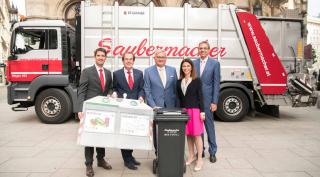
Lower Austria becomes smart: the future of the digital recycling economy starts here
Using a digital platform and special sensors, the aim is to switch over to needs-based environmentally-efficient emptying. In the district of Tulln, the Tulln Municipal Association for Waste Disposal (GVA Tulln) and Saubermacher have begun using artificial intelligence and direct feedback to improve the accuracy of waste separation. Digitisation partner Magenta Telekom is also on board with both projects. All technologies have been developed in Austria.
Project 1: Intelligent glass collection platform.
Saubermacher began working with AGR and GVA Horn in the district of Horn on a large-scale test for needs-based emptying of glass containers just a few weeks ago. The environmental pioneer is working on the development of a digital platform that both integrates information such as container levels, max. HGV payloads and calendar data and automatically creates a route plan. ‘The aim is optimised glass collection that takes into account residents’ satisfaction while at the same time increasing ecological and economic efficiency throughout the district of Horn,’ explains Haymo Schöner, authorised representative of AGR. Around 600 sensors have been fitted to around 300 containers. The project is expected to run until March 2020.
The extensive roll-out was agreed following a successful preliminary project. It had become apparent that optimal use of resources could not be guaranteed if the current static collection systems continued to be used. With the aid of the platform, it is hoped that dynamic (needs-based) emptying will, in future, be possible, reducing the need for unnecessary journeys and helping to save CO2 and minimise noise at the same time. At the end of the project, it is also hoped that overflowing containers will also become a thing of the past. ‘The initiative is unique in Austria and really is a pioneering achievement in Europe in more rural areas,’ explains Ralf Mittermayr, Chairman of the Board at Saubermacher. ‘The platform will have reached market maturity in the new year,’ he continues.
A key component of the platform is the high-tech sensor known as ANDI, which was specially developed in cooperation with the Styrian start-up SLOC to meet the requirements of glass containers. Using ultrasound and complex algorithms, the sensor measures the levels in containers and sends the information back to the Saubermacher platform on a daily basis. Data are transmitted using the NarrowBand IoT (NB-IoT) wireless technology offered by Magenta. The requirements on the transmission equipment are demanding, with a high degree of reliability required of the performance standards


Project 2: Artificial intelligence for creating awareness.
Saubermacher is currently working with the GVA Tulln and around 180 households in the municipalities of Judenau-Baumgarten, Sieghartskirchen and Wolfsgraben on a large project to test the effects of direct feedback on the separation behaviour of residents. The aim of the project is to increase recycling rates through correct separation of waste, to reduce residual landfill waste volumes and, as a result, to lower disposal costs. ‘The success of the project in Styria made me want to trial the technology,’ explains Alfred Riedl, President of the Austrian Association of Municipalities and President of the Association of Municipalities in Lower Austria. ‘We are all required to support the goals of the EU’s circular economy package and to protect our environment, so I’m particularly fond of this initiative.’ The project is expected to run until June 2020
The project uses the ‘reusable materials scanner’, a technology integrated into the refuse vehicle, to analyse the material composition of the waste. The scanner was developed by Saubermacher in collaboration with Graz University of Technology and Joanneum Research. The scanner uses sensors and multi-spectrum cameras to detect materials such as glass and plastic in residual landfill waste. A clear advantage: residents receive an SMS or app notification informing them of the quality of their separation. ‘Direct feedback is a key success factor as environmentally-friendly behaviours are rewarded immediately and positively reinforced. The concept is a global first,’ explains Ralf Mittermayr, Spokesperson of the Board. Apartment buildings will be the first to receive feedback on their separation behaviour. A ‘notice board’, developed by Magenta and used for the first time with Saubermacher, is being used as a source of information. ‘The digital notice board allows us to demonstrate that we are a reliable digitisation partner for municipalities and companies. Together, we are developing digital processes that will help to optimise the entire value-added chain, especially processes revolving around the Internet of Things. The digital notice board will give building administrators, public facilities and residents an easy leap into digital living,’ explains Maria Zesch, COO for Business and Digitisation at Magenta Telekom.
Smarter protection for the environment.
Around 70% of the waste that ends up in residual landfill waste bins doesn’t need to be there. Half of it is reusable materials that cannot then be recycled. Smaller pilot projects conducted in Styria have shown that the miss-sorting can be halved, with only half as much waste paper, plastics, metal and bio-waste being placed in the black bin. ‘EU circular economy targets state that Austria needs to recycle around 500,000 more tonnes of waste. If the reusable materials scanner were to be implemented nationwide, it would get us half way to that target,’ explains Hans Roth, founder of Saubermacher. ‘We are working with other municipalities to determine in which larger region we will use our systems starting in 2020,’ he continues.
Press release
Contact
For press inquiries please contact:



